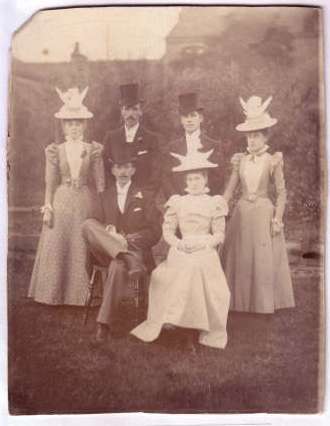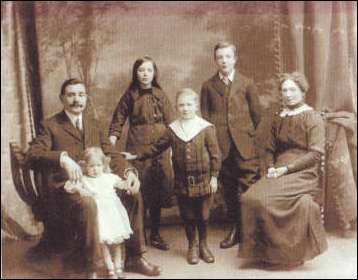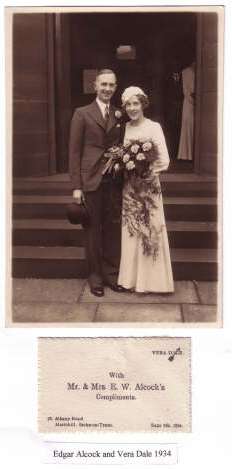|
In 1895 two couples were married at
opposite ends of the county and were destined to reside in the Parish or
very close by. This is a good example of how country people were
attracted to the town, never forgetting their origins, and frequently
visiting the old folks back home.

The Dale's Wedding -
1895
John Dale of Harriseahead and Ann
Painter of Mow Cop were married at Harriseahead. He was a grocer's
traveller, she had been a lady's companion with a prosperous family
in Hanley.
Thomas Alcock and Annie Wilne were married in the same year at St
Mary's Church, Uttoxeter. He was a railwayman from Leigh Station,
she was the youngest daughter of a nurseryman in Uttoxeter.
The Dales took a two-bedroomed terrace
house in Watford Street, having been recommended to look at the new
houses by Ann's ex-employer during a visit to show off her young man.
Shops, church, schools and jobs would all soon be available. Over the
next twelve years they produced four children, a boy and three girls.
John Dale travelled in a pony and trap over a wide area, taking orders
from and arranging deliveries by cart to small grocers shops. He
sometimes did not arrive home until late evening, and carried a pistol
and knuckleduster for his own protection. He knew what rough areas there
were, having originated in Harriseahead which had a questionable
reputation. Ann and her eldest daughter remained in that house until she
died in 1957 and the daughter died in her eighties.
The Alcocks
moved to Stoke when Thomas was
promoted to Guard and transferred to Stoke Station. The small terrace
cottage in Havelock Street, near the Roebuck could not have been more
convenient for all their requirements. Over the next fifteen years they
too produced four children, two boys and two girls, and were to remain
in that house until the surviving Annie died in her mid-eighties.

The Alcock family - 1913
Both the houses had gas lighting, and the
Duckett system of sanitation, where a salt-glazed stoneware
cylinder similar to a chimney pot, was installed directly over the sewer
beneath: hand-flushing was by water from an enamel pail kept in the
small out-house for that purpose. Both these utilities were a source of
open-mouthed amazement to small boys in the 1940's, but in the 1950's
the Watford Street house was converted to electricity and the flushing
lavatory. Havelock Street never was.
There were apocryphal tales of gloves and
prayer books disappearing down the shaft in the rush to get ready for
church on a Sunday morning. Both families were staunch Church of
England, the Alcocks attending St Peter's, while the Dales became
members of the new St Jude's congregation. Thomas Alcock's father John,
was verger and sexton at Leigh Church as were his ancestors before him.
The old thatched, timber-framed family house in Leigh was called Church
View. Family members carried out those offices until the 1990's. The
house survives to this day.

The joining of two
families
Edgar Alcock and Vera Dale - 1934
  
next: parish life
previous: St. Jude's church and town
|
![]()
![]()
![]()